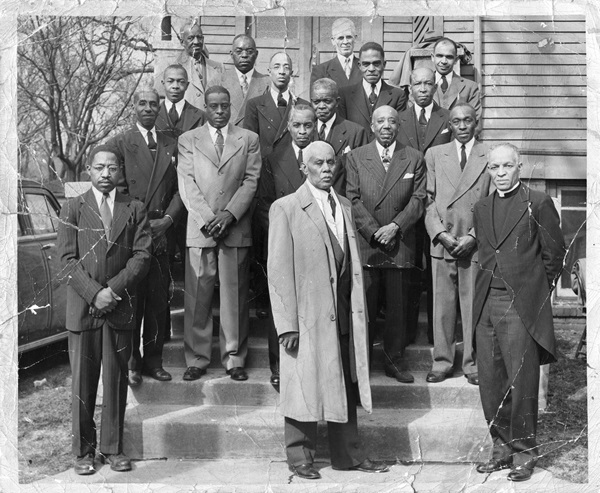2016 marked the 15th anniversary of the beginning of the African-American Methodist Heritage Center in Madison, New Jersey. For many years, there was a concern that the legacy of African-Americans in Methodism was being lost because heirs were not always aware that items like papers, journals or photographs were of value to the church. The center was created to "preserve, protect and promote" that history.
Delegates to the 2004 General Conference in Pittsburgh officially approved the creation of the center, but the work began several years earlier.
In 2001, members of Black Methodists for Church Renewal proposed the creation of an institution to celebrate and maintain the story of black Methodism. Bishop Forrest C. Stith was asked to take the leadership, assembling a task force to develop a plan of action.
The original location for the center was at Asbury United Methodist Church in Washington, D.C., where Carol Travis, the center's executive assistant, is a member. She was responsible for sorting and cataloguing the artifacts that were donated.
{full_page_ad}
"We found that after the church merged in 1968, many of our foremothers and forefathers were afraid that the history of African-Americans would be lost in The United Methodist Church," Travis said.
In 2007 the center entered into a partnership with the General Commission on Archives and History, giving it a permanent home at Drew University, where the denomination's archives are housed.
A place for history
"The African-American Methodist Heritage Center is one of the General Commission on Archives and History's most treasured partners," said the Rev. Fred Day, general secretary. It is "setting aside a spot for people and parts of Methodism that have been with us since the beginning, but who haven't always been treated with the dignity and equality and enthusiasm and importance that they should have been given."
Travis said, "I get two or three calls a week from people who are going through their father's, their grandfather's papers and they know about us. Or they say, ‘I've just found 10 years' worth of minutes from the Central Jurisdiction. Do you have a place for them?' Of course I do! Those are the kinds of things that we really hope people will send to us so that long after all of us are gone, that material will continue to be there."
The center currently houses around 32 cubic feet of artifacts, papers and other memorabilia. Numerous collections have been acquired over the years. Among the acquisitions of note are pictures of historic black colleges and those of Bishop W. T. Handy Jr. Augmenting the center's collections are many other Archives and History collections, including Central Jurisdiction newsletters. During a painful period of segregation in The Methodist Church, all Methodist African-American conferences and local churches in the United States were placed in the Central Jurisdiction. The jurisdiction lasted from 1939 to 1968 and was eliminated by the merger that created The United Methodist Church.
Having such a massive archive in one place aids researchers and those simply interested in the history, as they don't have to seek these documents from numerous locations.
"It's a place where anyone can go and get the material," Travis said. "You don't have to figure out, ‘Do I need to go to Gammon, do I need to go to Fisk?' Folks know that they can come to us and if we don't have it, we can send them off in the right direction."
Be a part of preservation
Travis said one of her main roles is to visit churches all around the United States to talk about the center and urge members to take part in preserving their history.
"I think we all need to care more about each other's stories. That's all we have, our stories of how we made it from point A to point B.
"I remember listening to President Obama doing the funeral for Rev. Pinckney [The Rev. Clementa Pinckney was shot and killed in 2015 during a prayer service at Emanuel African Methodist Episcopal Church in Charleston, South Carolina]. And he made a statement that really resonated with me. He said, ‘We have a value for history, but not each other's history.' I think if folks understood more about each other's history we'd have a lot more harmonious relationship."
Dale Patterson, archivist-records administrator at Archives and History, said, "Our lives — whether as individuals, as a church, a community — are actually large and complicated. It's really exciting to see communities asking the question, ‘How can we become involved in telling that complicated story?' That's going to enrich our history and really help us understand, even more, all the things that we've done, what type of church, what type of denomination we are."
Travis said one of the center's current projects is compiling an oral history through interviews with the wives of bishops.
Anticipating awarding grants
She also mentioned plans for establishing the Bishop Forrest C. Stith Grant to honor Stith's leadership in helping found the center. Grants would be made available for African-American congregations doing or planning innovative ways to recover, preserve and present their histories, and for individuals conducting historical research or projects on African-Americans in Methodism.
While details are still being finalized, Travis said she hoped that May, the month of Heritage Sunday, could be the time to either open the application process or close it and award the grant.
Joey Butler is a multimedia producer/editor at United Methodist Communications in Nashville, Tennessee. Lilla Marigza is a producer for UMTV.

